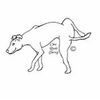Debunking the “Ancient Alien” concept
Feb 11, 2024 17:55:19 #
Feb 13, 2024 03:26:59 #
KillroyII wrote:
Aliens will not bother to set foot on our planet… until they need a source of protein!!!
If they build anything, it would be a meat processing plant.
If they build anything, it would be a meat processing plant.
Sounds like an old Twilight Zone episode, "To Serve Man" (Season 3, Episode 24, 1962), which was adapted from a sci fi short story published in 1950.
Feb 13, 2024 09:01:34 #
Aliens can only plausible without evidence...if some folks are simply desperate to have others make decisions for them...even as a species. That's what religion represents as well...same thing.
Feb 13, 2024 13:47:53 #
Wyantry wrote:
A serious analysis of the failings of various “ancient aliens” claims.
The claims are just that — they do not even rise to the level of Hypothesis, and certainly not to the level of scientifically verifiable Theory.
https://www.ancientaliensdebunked.com/
A long (3 hr) analysis.
The claims are just that — they do not even rise to the level of Hypothesis, and certainly not to the level of scientifically verifiable Theory.
https://www.ancientaliensdebunked.com/
A long (3 hr) analysis.
You can't disprove it anymore than you can prove it. Everybody is entitled to their own opinion. Magic words " scientific theory ", heavy on "theory", they change everyday.


Feb 13, 2024 14:49:02 #
One Rude Dawg wrote:
You can't disprove it anymore than you can prove it. Everybody is entitled to their own opinion. Magic words " scientific theory ", heavy on "theory", they change everyday. 



Sort of OK -
Except the Egyptians actually built all those Pyramids all by themselves without needing any help from those This Old House Alien helpers


Feb 13, 2024 22:14:23 #
Wyantry
Loc: SW Colorado
One Rude Dawg wrote:
You can't disprove it anymore than you can prove it. Everybody is entitled to their own opinion. Magic words " scientific theory ", heavy on "theory", they change everyday.
There is vast difference between a scientific Theory, and the common usage of the term — as in “it’s only a theory”.
A scientific theory is an EXPLANATION of observed phenomena. A verifiable, peer-reviewed, mathematically accurate, predictive analysis and account of conditions.
Common usage of the term “theory” is actually closer to a “personal belief” or “hypothesis” — both of which are not explanatory, not verifiable, not predictive and not accurate.
Feb 14, 2024 06:54:12 #
Wyantry wrote:
There is vast difference between a scientific Theory, and the common usage of the term — as in “it’s only a theory”.
A scientific theory is an EXPLANATION of observed phenomena. A verifiable, peer-reviewed, mathematically accurate, predictive analysis and account of conditions.
Common usage of the term “theory” is actually closer to a “personal belief” or “hypothesis” — both of which are not explanatory, not verifiable, not predictive and not accurate.
A scientific theory is an EXPLANATION of observed phenomena. A verifiable, peer-reviewed, mathematically accurate, predictive analysis and account of conditions.
Common usage of the term “theory” is actually closer to a “personal belief” or “hypothesis” — both of which are not explanatory, not verifiable, not predictive and not accurate.
Exactly correct.
I would add that folks who reject sciences in certain areas...because they don't agree with the conclusions...are being hypocritical.
It's all the same science. Science isn't a buffet from which one chooses according to their personal beliefs.
The very same science that built your computer is the very same science that explains the universe.
All the same processes...methodologies...peer reviews...everything always being exposed to be knocked down by other scientists (which scientists relish doing btw).
The same science that explains evolution or DNA...is the same science that keeps you up in the air when traveling by aircraft.
Same science...
Feb 14, 2024 13:32:38 #
Wyantry wrote:
There is vast difference between a scientific Theory, and the common usage of the term — as in “it’s only a theory”.
A scientific theory is an EXPLANATION of observed phenomena. A verifiable, peer-reviewed, mathematically accurate, predictive analysis and account of conditions.
Common usage of the term “theory” is actually closer to a “personal belief” or “hypothesis” — both of which are not explanatory, not verifiable, not predictive and not accurate.
A scientific theory is an EXPLANATION of observed phenomena. A verifiable, peer-reviewed, mathematically accurate, predictive analysis and account of conditions.
Common usage of the term “theory” is actually closer to a “personal belief” or “hypothesis” — both of which are not explanatory, not verifiable, not predictive and not accurate.
Your trying to tell me " scientific theories " don't change. They change all the time, have been for centuries.


Feb 14, 2024 18:25:09 #
One Rude Dawg wrote:
Your trying to tell me " scientific theories " don't change. They change all the time, have been for centuries. 



Of course they change...based upon new evidence. Not opinions though...evidence.
You have zero evidence for your opinion...other than other opinions.
Feb 14, 2024 23:07:13 #
Reuss Griffiths
Loc: Ravenna, Ohio
Canisdirus wrote:
Exactly correct. br br I would add that folks who... (show quote)
You have zero evidence for your opinion...other than other opinions.[/quote]
I'm not sure that you folks grasp the definition of a theory. In scientific terms it is a hypothesis to be proven. If it's proven, it is no longer a theory, it becomes a law, e.g. Newton's laws of motion or the three laws of thermodynamics. Einstein's theory of relativity is still a theory even though it has correctly predicted effects of space-time, etc.. There are still some questions regarding it and it remains a theory. Scientific consensus counts for nothing. At the time Einstein published his theory of relativity, a large majority of his peers disagreed with his theory but most have since recanted. That is why theories change. They keep being refined by additional data and interpretation. That is the scientific method.
Feb 14, 2024 23:32:18 #
Wyantry
Loc: SW Colorado
One Rude Dawg wrote:
You’re trying to tell me "scientific theories” don't change. They change all the time, have been for centuries. :
Not at all. Scientific theories may be falsified (disproven) at any time, by new evidence. Theories may be revised, or new evidence explaning phenomena may be found.
A great example is from physics:
Newton formalized the theory of Universal Gravitational Attraction — an instantaneous attractive force acting upon every object in the universe (and proportional to distance).
Einstein revised this by introducing the limiting factor of the speed of light. PREDICTED gravity would attract (bend) light — this was verified by observers during a solar eclipse. Stars that should have been occluded by the solar disk were visible!
~~~~~~~~~~~~~
Another “adjustment” to the theoretical explanation of the cosmos with Newton’s laws, was the explanation of increased mass at higher velocities, and time-dilation at high velocities. These were not even addressed by Newton, yet were PREDICTED by Einstein’s theories, and OBSERVATION confirmed those theoretical predictions.
So the previous theories were AMENDED when special conditions were known to exist.
~~~~~~~~~~~~~~
Another classic example of a theory’s logic was Mendeleev’s theory of the organization of the chemical elements.
Prior to Mendeleev, there had been numerous attempts to order the elements. Several hypotheses were advanced, but none accounted for all observed phenomena or chemical reactivity.
Mendeleev arranged the known elements by mass / atomic number (number of protons), and put them in groups according to their outermost shell electron count (valence electrons).
When completed, there were several “gaps” where elements should, according to Mendeleev’s theory, exist. At later dates these elements were identified, and were found to have the physical and chemical properties predicted.
~~~~~~~~~~~~~~
Quite a lot was known about breeding and trait inheritance, yet it was not scientifically studied with controlled experiments until Friar aGregor Mendel devised, carried out, analyzed and formulated specific methods of inheritance. His experiments with peas established the basis for genetics — a true theory and explanation of previous “theories” of inheritance.
~~~~~~~~~~~~~~
There are (almost) innumerable instances of theories being disproven, discarded, modified or altered based upon new or more precise evidence.
Feb 14, 2024 23:51:13 #
Wyantry wrote:
Not at all. Scientific theories may be falsified... (show quote)
Scientific theories must also wait for technological development. Genetics theories (proposed by Mendel and Darwin) also had to wait on inventions such as x-rays before proven. It wasn't until improvements in astronomical instruments that Edwin Hubble was able to prove the expanding universe.
And how long was "The Big Bang" known as a theory, before "Theory" was dropped?
Feb 15, 2024 06:22:49 #
Reuss Griffiths wrote:
I'm not sure that you folks grasp the definition o... (show quote)
You took the long way round the barn to agree with what I said.
Feb 15, 2024 10:04:17 #
Feb 15, 2024 10:05:31 #
larkahn wrote:
Sounds like an old Twilight Zone episode, "To Serve Man" (Season 3, Episode 24, 1962), which was adapted from a sci fi short story published in 1950.
There's also a "Simpsons" version of that.
If you want to reply, then register here. Registration is free and your account is created instantly, so you can post right away.




